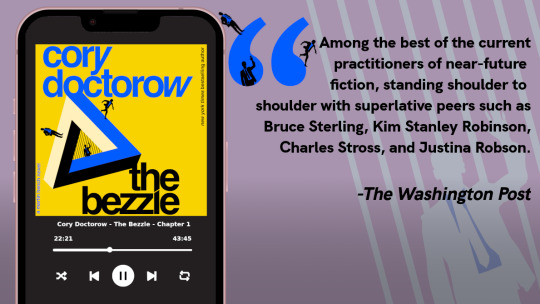#john deere
Text
How lock-in hurts design

Berliners: Otherland has added a second date (Jan 28) for my book-talk after the first one sold out - book now!

If you've ever read about design, you've probably encountered the idea of "paving the desire path." A "desire path" is an erosion path created by people departing from the official walkway and taking their own route. The story goes that smart campus planners don't fight the desire paths laid down by students; they pave them, formalizing the route that their constituents have voted for with their feet.
Desire paths aren't always great (Wikipedia notes that "desire paths sometimes cut through sensitive habitats and exclusion zones, threatening wildlife and park security"), but in the context of design, a desire path is a way that users communicate with designers, creating a feedback loop between those two groups. The designers make a product, the users use it in ways that surprise the designer, and the designer integrates all that into a new revision of the product.
This method is widely heralded as a means of "co-innovating" between users and companies. Designers who practice the method are lauded for their humility, their willingness to learn from their users. Tech history is strewn with examples of successful paved desire-paths.
Take John Deere. While today the company is notorious for its war on its customers (via its opposition to right to repair), Deere was once a leader in co-innovation, dispatching roving field engineers to visit farms and learn how farmers had modified their tractors. The best of these modifications would then be worked into the next round of tractor designs, in a virtuous cycle:
https://securityledger.com/2019/03/opinion-my-grandfathers-john-deere-would-support-our-right-to-repair/
But this pattern is even more pronounced in the digital world, because it's much easier to update a digital service than it is to update all the tractors in the field, especially if that service is cloud-based, meaning you can modify the back-end everyone is instantly updated. The most celebrated example of this co-creation is Twitter, whose users created a host of its core features.
Retweets, for example, were a user creation. Users who saw something they liked on the service would type "RT" and paste the text and the link into a new tweet composition window. Same for quote-tweets: users copied the URL for a tweet and pasted it in below their own commentary. Twitter designers observed this user innovation and formalized it, turning it into part of Twitter's core feature-set.
Companies are obsessed with discovering digital desire paths. They pay fortunes for analytics software to produce maps of how their users interact with their services, run focus groups, even embed sneaky screen-recording software into their web-pages:
https://www.wired.com/story/the-dark-side-of-replay-sessions-that-record-your-every-move-online/
This relentless surveillance of users is pursued in the name of making things better for them: let us spy on you and we'll figure out where your pain-points and friction are coming from, and remove those. We all win!
But this impulse is a world apart from the humility and respect implied by co-innovation. The constant, nonconsensual observation of users has more to do with controlling users than learning from them.
That is, after all, the ethos of modern technology: the more control a company can exert over its users ,the more value it can transfer from those users to its shareholders. That's the key to enshittification, the ubiquitous platform decay that has degraded virtually all the technology we use, making it worse every day:
https://pluralistic.net/2023/02/19/twiddler/
When you are seeking to control users, the desire paths they create are all too frequently a means to wrestling control back from you. Take advertising: every time a service makes its ads more obnoxious and invasive, it creates an incentive for its users to search for "how do I install an ad-blocker":
https://www.eff.org/deeplinks/2019/07/adblocking-how-about-nah
More than half of all web-users have installed ad-blockers. It's the largest consumer boycott in human history:
https://doc.searls.com/2023/11/11/how-is-the-worlds-biggest-boycott-doing/
But zero app users have installed ad-blockers, because reverse-engineering an app requires that you bypass its encryption, triggering liability under Section 1201 of the Digital Millennium Copyright Act. This law provides for a $500,000 fine and a 5-year prison sentence for "circumvention" of access controls:
https://pluralistic.net/2024/01/12/youre-holding-it-wrong/#if-dishwashers-were-iphones
Beyond that, modifying an app creates liability under copyright, trademark, patent, trade secrets, noncompete, nondisclosure and so on. It's what Jay Freeman calls "felony contempt of business model":
https://locusmag.com/2020/09/cory-doctorow-ip/
This is why services are so horny to drive you to install their app rather using their websites: they are trying to get you to do something that, given your druthers, you would prefer not to do. They want to force you to exit through the gift shop, you want to carve a desire path straight to the parking lot. Apps let them mobilize the law to literally criminalize those desire paths.
An app is just a web-page wrapped in enough IP to make it a felony to block ads in it (or do anything else that wrestles value back from a company). Apps are web-pages where everything not forbidden is mandatory.
Seen in this light, an app is a way to wage war on desire paths, to abandon the cooperative model for co-innovation in favor of the adversarial model of user control and extraction.
Corporate apologists like to claim that the proliferation of apps proves that users like them. Neoliberal economists love the idea that business as usual represents a "revealed preference." This is an intellectually unserious tautology: "you do this, so you must like it":
https://boingboing.net/2024/01/22/hp-ceo-says-customers-are-a-bad-investment-unless-they-can-be-made-to-buy-companys-drm-ink-cartridges.html
Calling an action where no alternatives are permissible a "preference" or a "choice" is a cheap trick – especially when considered against the "preferences" that reveal themselves when a real choice is possible. Take commercial surveillance: when Apple gave Ios users a choice about being spied on – a one-click opt of of app-based surveillance – 96% of users choice no spying:
https://arstechnica.com/gadgets/2021/05/96-of-us-users-opt-out-of-app-tracking-in-ios-14-5-analytics-find/
But then Apple started spying on those very same users that had opted out of spying by Facebook and other Apple competitors:
https://pluralistic.net/2022/11/14/luxury-surveillance/#liar-liar
Neoclassical economists aren't just obsessed with revealed preferences – they also love to bandy about the idea of "moral hazard": economic arrangements that tempt people to be dishonest. This is typically applied to the public ("consumers" in the contemptuous parlance of econospeak). But apps are pure moral hazard – for corporations. The ability to prohibit desire paths – and literally imprison rivals who help your users thwart those prohibitions – is too tempting for companies to resist.
The fact that the majority of web users block ads reveals a strong preference for not being spied on ("users just want relevant ads" is such an obvious lie that doesn't merit any serious discussion):
https://www.iccl.ie/news/82-of-the-irish-public-wants-big-techs-toxic-algorithms-switched-off/
Giant companies attained their scale by learning from their users, not by thwarting them. The person using technology always knows something about what they need to do and how they want to do it that the designers can never anticipate. This is especially true of people who are unlike those designers – people who live on the other side of the world, or the other side of the economic divide, or whose bodies don't work the way that the designers' bodies do:
https://pluralistic.net/2022/10/20/benevolent-dictators/#felony-contempt-of-business-model
Apps – and other technologies that are locked down so their users can be locked in – are the height of technological arrogance. They embody a belief that users are to be told, not heard. If a user wants to do something that the designer didn't anticipate, that's the user's fault:
https://www.wired.com/2010/06/iphone-4-holding-it-wrong/
Corporate enthusiasm for prohibiting you from reconfiguring the tools you use to suit your needs is a declaration of the end of history. "Sure," John Deere execs say, "we once learned from farmers by observing how they modified their tractors. But today's farmers are so much stupider and we are so much smarter that we have nothing to learn from them anymore."
Spying on your users to control them is a poor substitute asking your users their permission to learn from them. Without technological self-determination, preferences can't be revealed. Without the right to seize the means of computation, the desire paths never emerge, leaving designers in the dark about what users really want.
Our policymakers swear loyalty to "innovation" but when corporations ask for the right to decide who can innovate and how, they fall all over themselves to create laws that let companies punish users for the crime of contempt of business-model.

I'm Kickstarting the audiobook for The Bezzle, the sequel to Red Team Blues, narrated by @wilwheaton! You can pre-order the audiobook and ebook, DRM free, as well as the hardcover, signed or unsigned. There's also bundles with Red Team Blues in ebook, audio or paperback.

If you'd like an essay-formatted version of this post to read or share, here's a link to it on pluralistic.net, my surveillance-free, ad-free, tracker-free blog:
https://pluralistic.net/2024/01/24/everything-not-mandatory/#is-prohibited

Image:
Belem (modified)
https://commons.wikimedia.org/wiki/File:Desire_path_%2819811581366%29.jpg
CC BY 2.0
https://creativecommons.org/licenses/by/2.0/deed.en
#pluralistic#desire paths#design#drm#everything not mandatory is prohibited#apps#ip#innovation#user innovation#technological self-determination#john deere#twitter#felony contempt of business model
3K notes
·
View notes
Text

Brand new John Deere coffin. They’ve had it listed it for over a month
650 notes
·
View notes
Text

John Deere Country Farm Girl
saltytimemachinefestival.tumblr.com/archive
#john deere#tractor#farm tractor#country#long blonde hair#country girl#country girls#cowgirl#cowgirls#farm girl#farm girls#outside#outdoors#rural#freedom#beautiful ass#cutie w a bootie#great butt#nice buns#beauty#sexy breasts#sexy content#beautiful girls#pretty girls#beautiful women#mature
380 notes
·
View notes
Text

#shirtless#muscle#jock#country boy#farmer#working man#baseball cap#ballcap#scruff#facial scruff#shoulders#washboard abs#muscular arms#blue jeans#boots#tractor#john deere#dog#labrador retriever#outdoors#enlarged 2.75x#photo enlargement#photo enhancement#color correction
442 notes
·
View notes
Text

71 notes
·
View notes
Text

👨🏻🌾
www.instagram.com/wolfdeutschland
#wolfdeutschland#hairy#hairychest#gay#farm#bear#bluecollar#tradie#bearded#daddy#farmhand#farmlife#bauer#john deere
136 notes
·
View notes
Text

Deere & Company Corporate Headquarters, 1978, in Moline, Illinois. Designed landscape by Sasaki Associates, in the building by Saarinen / Roche-Dinkeloo.
Scan
133 notes
·
View notes
Text
Unusual Model Train Sets
A long time ago in 2020, I did a thread on Twitter of unusual model train sets. Mainly to showcase some that don't seem real, but are/were. Here's a selection of such trains.

I pity the fool who doesn't have this set.

It's more than meats the eye.

Our secret weapon in defeating Cobra.

I don't see a correlation between Rambo and trains to warrant this set.

Of course. When I think of a hit comedy show about medical personnel during the Korean War, I think a train set would make sense given the context.
(Friend of mine said the following:

Though my point still stands just from the episodes I've seen.)

This has the best '80s aesthetic I've seen for a train set.

As someone who launched Hot Wheel cars in front or over trains, I legit think this concept is fun.
Speaking of Hot Wheels...

As someone who still has this set, I can tell you that while it's fun, it's not compatible with HO tracks. A real bummer if you ask me.

I have a soft spot for train sets based on tractor brands (I have relatives who live in Eastern Washington who collect old tractors). The only unusual thing I could find is when they are a passenger set.

Which makes no sense considering what the IP is.

I don't see the connection between auto parts and trains, but the Photoshopped image on the box is cool.


Again, don't see much of a connection, in this case of NASCAR sets. However, if your train is taking a left hand turn every time it goes around the track then it makes sense (I guess).
And that is the list of unusual train sets I could find for this post. This is not meant to say they're dumb. I actually find sets like these quite entertaining and fascinating, particularly the TYCO sets of Rambo, GI Joe, A-Team, and Transformers just for how niché they were. And these came out around the time Shining Time Station premiered.
If you know any others, please reblog with the train set that you find unusual or barely has any connection to trains.
#model railroad#railway#railroad#toy train#tyco sets#bachmann trains#lionel trains#A-Team#gi joe#Rambo#transformers#mash 4077#Hot Wheels#NAPA Auto Parts#John Deere#nascar#science fiction#model trains
101 notes
·
View notes
Text
John Deere's repair fake-out

Last week, a seeming miracle came to pass: John Deere, the Big Ag monopolist that — along with Apple — has led the Axis of Evil that killed, delayed and sabotaged dozens of Right to Repair laws, sued for peace, announcing a Memorandum of Understanding with the American Farm Bureau Federation to make it easier for farmers to fix their own tractors:
https://www.fb.org/files/AFBF_John_Deere_MOU.pdf
This is a move that’s both badly needed and long overdue. Deere abuses copyright law to force farmers to pay for official repairs — even when the farmer does the repair. That’s possible thanks to a practice called VIN locking, in which engine parts come with DRM that prevents the tractor from recognizing them until they pay hundreds of dollars for a John Deere technician to come to their farm and type an unlock code into the tractor’s console:
https://doctorow.medium.com/about-those-kill-switched-ukrainian-tractors-bc93f471b9c8
Like all DRM, VIN locks are covered by Section 1201 of the Digital Millennium Copyright Act (DMCA), a 1998 law that criminalizes distributing tools to bypass “access controls,” even if you do so for a lawful purpose (say, to fix your own tractor using a part you paid for). Violations of DMCA 1201 carry a penalty of 5 years in prison and a $500k fine — for a first offense.
This means that Deere owners are locked into using Deere for repairs, which also means that if Deere decides something isn’t broken, a farmer can’t get it fixed. This is very bad news indeed, because John Deere tractors are just computers in a fancy, mobile case, and John Deere is incredibly bad at digital security:
https://pluralistic.net/2021/04/23/reputation-laundry/#deere-john
That’s scary stuff, because John Deere is a monopolist, and a successful attack on the always-connected, networked tractors and other equipment it supplies to the world’s farmers could endanger the global food supply.
Deere doesn’t want to make insecure tractors, but it also doesn’t want to be embarrassed by security researchers who point out that its security is defective. Because security researchers have to bypass Deere tractors’ locks to probe their security, Deere can leverage DMCA1201 into a veto over who gets to warn the public about the mistakes it made.
It’s not just security researchers that Deere gets to gag: the company uses its repair monopoly to threaten farmers who complain about its business practices, holding their million-dollar farm equipment hostage to their silence:
https://pluralistic.net/2022/05/31/dealers-choice/#be-a-shame-if-something-were-to-happen-to-it
This all adds up to what Jay Freeman calls “felony contempt of business model,” an abuse of copyright law that allows a monopolistic corporation to reach beyond its own walls and impose its will on it customers, critics and competitors:
https://locusmag.com/2020/09/cory-doctorow-ip/
If Deere was finally suing for peace in the Repair Wars, well, that was wonderful news indeed — as I said, a seeming miracle.
But — like all miracles — it was too good to be true.
The MOU that Deere and the Farm Bureau signed is full of poison pills, gotchas, fine-print and mendacity, as Lauren Goode documents in her Wired article, “Right-to-Repair Advocates Question John Deere’s New Promises”:
https://www.wired.com/story/right-to-repair-advocates-question-john-deeres-new-promises/
For starters, the MOU makes the Farm Bureau promise to end its advocacy for state Right to Repair bills, which would create a repair system governed by democratically accountable laws, not corporate fiat. Clearly, Deere has seen the writing on the wall, after the passage in 2002 of Right to Repair laws in New York and Colorado:
https://www.eff.org/deeplinks/2022/06/when-drm-comes-your-wheelchair
These two bills broke the corporate anti-repair coalition’s winning streak, which saw dozens of state R2R bills defeated:
https://pluralistic.net/2021/05/26/nixing-the-fix/#r2r
Deere’s deal-with-the-devil is a cynical ploy to brake R2R’s momentum and ensure that any repairs are carried out on Deere’s terms. Now, about those terms…
Deere’s deal offers independent repair shops access to diagnostic tools and parts “on fair and reasonable terms,” a murky phrase that can mean whatever Deere decides it means. Crucially, the deal is silent on whether Deere will supply the tools needed to activate VIN locks, meaning that farmers will still be at Deere’s mercy when they effect their own repairs.
What’s more, the deal itself isn’t legally binding, and Deere can cancel it at any time. Once you dig past the headline, the Deere’s Damascene conversion to repair advocacy starts to look awfully superficial — and deceptive.
One person who wasn’t fooled is sick.codes, the hacker who has done the most important work on reverse-engineering Deere’s computer systems, culminating in last summer’s live, on-stage hack of a John Deere tractor at Defcon:
https://pluralistic.net/2022/08/15/deere-in-headlights/#doh-a-deere
Shortly after the announcement, Sick.codes tweeted how the fine-print in the MOU would have prevented him from doing the work he’s already done (including “a direct stab at me lol”):
https://twitter.com/sickcodes/status/1612484935495057409
As with other instances of monopolistic, corporate copyfraud — like, say, the deceptive Open Gaming License — the John Deere capitulation is really a bid to take away your rights, dressed up as a gift of more rights:
https://mostlysignssomeportents.tumblr.com/post/706163316598407168/good-riddance-to-the-open-gaming-license
[Image ID: Hieronymus Bosch's painting, 'The Conjurer.' The Conjuror's shell-game table holds a small John Deere tractor that the audience of yokels gawps at. One yokel is wearing a John Deere hat. The conjurer is holding a wrench.]
1K notes
·
View notes
Text

John Deere Girl
saltytimemachinefestival.tumblr.com/archive
#john deere#country girl#country girls#cowgirl#cowgirls#farm girl#farm girls#outside#outdoors#rural#country#beautiful ass#cutie w a bootie#great butt#nice buns#beauty#sexy breasts#sexy content#adult model#sexy breast#beautiful girls#pretty girls#beautiful women#sexy titts#18+ only#18+ content#hot as hell#so hot 🔥🔥🔥#great bodi
192 notes
·
View notes
Photo

A goddamned tractor? Yeah, it runs Doom.
Directly quoting iFixit CEO Kyle Wiens on Twitter, reporting live from DefCon 2022 in Las Vegas:
Sick Codes has jailbroken a John Deere, and this is just the beginning. Turns out our entire food system is built on outdated, unpatched Linux and Windows CE hardware with LTE modems.
John Deere has repeatedly told regulators that farmers can't be trusted to repair their own equipment. This foundational work will pave the path for farmers to retake control of the equipment that they own.
And yes, that is corn-themed Doom running on a John Deere touchscreen. sickcodes really went all out for this. You can harvest corn to raise your health or go hunt down the piggies!
Putting together a themed mod for your security-exploit demonstration is a whole new level from what we usually see. Kudos!
Thanks to Linguica for bringing this to my attention!
969 notes
·
View notes
Text


130 notes
·
View notes
Text
#18+ account#hot as fuck#muscle mommy#adult model#hot nude#sexy content#sexy titts#sizequeen#spicy accountant#+18 or +adult only#country#blue collar#big bootie#big tiddy committee#cutie w a bootie#john deere#farmlife
91 notes
·
View notes
Text




John Deere Tractor CC
NOW PUBLIC!!
Download: Patreon
#ts4cc#sims 4 custom content#ts4#sims 4 simblr#ts4 simblr#the sims 4#sims 4 cc#sims 4#simblr#deco cc#farming#agriculture#tractor#john deere
151 notes
·
View notes
Text


Deere & Company Corporate Headquarters, 1978, in Moline, Illinois. Designed landscape by Sasaki Associates, in the building by Saarinen / Roche-Dinkeloo.
Scan. In 300 and 400 dpi.
#scan#deere & company#john deere#moline#illinois#interior#interior green#interior landscape#70s aesthetic#1970s#1980s
73 notes
·
View notes
